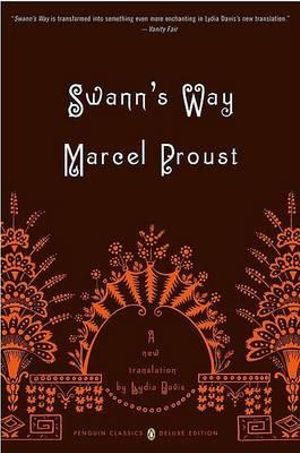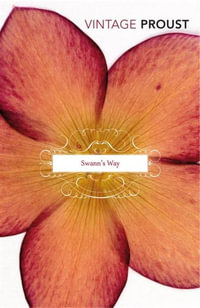
Swann's Way
Penguin Classics Deluxe Edition
By: Marcel Proust, Lydia Davis (Introduction by, Translator)
Paperback | 30 November 2004
At a Glance
468 Pages
18+
26.4 x 17 x 7.2
Paperback
$40.99
or 4 interest-free payments of $10.25 with
orShips in 5 to 10 business days
Please note the pages on this book have been produced with bevelled or rough edge to create an old style look. The publisher has deliberately chosen to produce the book this way.
Product Description
Marcel Proust's In Search of Lost Time is one of the most entertaining reading experiences in any language and arguably the finest novel of the twentieth century. But since its original prewar translation there has been no completely new version in English. Now, Penguin Classics brings Proust's masterpiece to new audiences throughout the world, beginning with Lydia Davis's internationally acclaimed translation of the first volume, Swann's Way.
Swann's Way is one of the preeminent novels of childhood: a sensitive boy's impressions of his family and neighbors, all brought dazzlingly back to life years later by the taste of a madeleine. It also enfolds the short novel "Swann in Love," an incomparable study of sexual jealousy that becomes a crucial part of the vast, unfolding structure of In Search of Lost Time. The first volume of the work that established Proust as one of the finest voices of the modern age-satirical, skeptical, confiding, and endlessly varied in his response to the human condition-Swann's Way also stands on its own as a perfect rendering of a life in art, of the past recreated through memory.
Industry Reviews
I was about to change my position again, so that he should not catch sight of me; I had neither the time nor the need to do so. For what did I see! Face to face, in that courtyard where they had certainly never met before (M. de Charlus coming to the Hotel de Guermantes only in the afternoon, during the time when Jupien was at his office), the Baron, having suddenly opened wide his half-shut eyes, was gazing with extraordinary attentiveness at the ex-tailor poised on the threshold of his shop, while the latter, rooted suddenly to the spot in front of M. de Charlus, implanted there like a tree, contemplated with a look of wonderment the plump form of the ageing Baron. But, more astounding still, M. de Charlus's pose having altered, Jupien's, as though in obedience to the laws of an occult art, at once brought itself into harmony with it. The Baron, who now sought to disguise the impression that had been made on him, and yet, in spite of his affectation of indifference, seemed unable to move away without regret, came and went, looked vaguely into the distance in the way which he felt would most enhance the beauty of his eyes, assumed a smug, nonchalant, fatuous air. Meanwhile Jupien, shedding at once the humble, kindly expression which I had always associated with him, had--in perfect symmetry with the Baron--thrown back his head, given a becoming tilt to his body, placed his hand with grotesque effrontery on his hip, stuck out his behind, struck poses with the coquetry that the orchid might have adopted on the providential arrival of the bee. I had not supposed that he could look so unappealing. But I was equally unaware that he was capable of improvising his part in this sort of dumb show which (although he found himself for the first time in the presence of M. de Charlus) seemed to have been long and carefully rehearsed; one does not arrive spontaneously at that pitch of perfection except when one meets abroad a compatriot with whom an understanding then develops of itself, the means of communication being the same, even without having seen each other before.
This scene was not, however, positively comic; it was stamped with a strangeness, or if you like a naturalness, the beauty of which steadily increased. Try as M. de Charlus might to assume a detached air, to let his eyelids nonchalantly droop, every now and then he raised them, and at such moments turned on Jupien an attentive gaze. But (doubtless because he felt that such a scene could not be prolonged indefinitely in this place, whether for reasons which we shall understand later on, or possibly from that feeling of the brevity of all things which makes us determine that every blow must strike home, and renders so moving the spectacle of every kind of love), each time that M. de Charlus looked at Jupien, he took care that his glance should be accompanied by a word, which made it infinitely unlike the glances we usually direct at a person whom we scarcely know or do not know at all; he stared at Jupien with the peculiar fixity of the person who is about to say to you: 'Excuse my taking the liberty, but you have a long white thread hanging down your back,' or else: 'Surely I can't be mistaken, you come from Zurich too; I'm certain I must have seen you there often at the antique dealer's.' Thus, every other minute, the same question seemed to be put to Jupien intently in M. de Charlus's ogling, like those questioning phrases of Beethoven's, indefinitely repeated at regular intervals and intended--with an exaggerated lavishness of preparation--to introduce a new theme, a change of key, a 're-entry.' On the other hand, the beauty of the reciprocal glances of M. de Charlus and Jupien arose precisely from the fact that they did not, for the moment at least, seem to be intended to lead to anything further. It was the first time I had seen the manifestation of this beauty in the Baron and Jupien. In the eyes of both of them, it was the sky not of Zurich but of some oriental city, the name of which I had not yet divined, that I saw reflected. Whatever the point might be that held M. de Charlus and the ex-tailor thus arrested, their pact seemed concluded and these superfluous glances to be but ritual preliminaries, like the parties people give before a marriage which has been definitely arranged. Nearer still to nature--and the multiplicity of these analogies is itself all the more natural in that the same man, if we examine him for a few minutes, appears in turn a man, a man-bird, a man-insect, and so forth--one might have thought of them as a pair of birds, the male and the female, the male seeking to advance, the female--Jupien--no longer giving any sign of response to this stratagem, but regarding her new friend without surprise, with an inattentive fixity of gaze, doubtless considered more disturbing and the sole practicality now that the male had taken the first steps, and contenting herself with preening her feathers. At length Jupien's indifference seemed to suffice him no longer; from the certainty of having conquered to getting himself pursued and desired was but a step, and Jupien, deciding to go off to his work, went out through the carriage gate. It was only, however, after turning his head two or three times that he disappeared into the street, towards which the Baron, trembling lest he should lose the trail (boldly humming a tune, and not forgetting to fling a 'Good-day' to the porter, who, half-tipsy and engaged in treating a few friends in his back kitchen, did not even hear him), hurried briskly to catch up with him. At the same instant as M. de Charlus disappeared through the gate humming like a great bumble-bee, another, a real one this time, flew into the courtyard. For all I knew this might be the one so long awaited by the orchid, coming to bring it that rare pollen without which it must remain a virgin. But I was distracted from following the gyrations of the insect, for, a few minutes later, engaging my attention afresh, Jupien (perhaps to pick up a parcel which he did take away with him ultimately and which, in the emotion aroused in him by the appearance of M. de Charlus, he had forgotten, perhaps simply for a more natural reason) returned, followed by the Baron. The latter, deciding to precipitate matters, asked the tailor for a light, but at once observed: 'I ask you for a light, but I see I've left my cigars at home.' The laws of hospitality prevailed over the rules of coquetry. 'Come inside, you shall have everything you wish,' said the tailor, on whose features disdain now gave place to joy. The door of the shop closed behind them and I could hear no more. I had lost sight of the bumblebee. I did not know whether he was the insect that the orchid required, but I had no longer any doubt, in the case of a very rare insect and a captive flower, of the miraculous possibility of their conjunction when I considered that M. de Charlus (this is simply a comparison of providential chances, whatever they may be, without the slightest scientific claim to establish a relation between certain botanical laws and what is sometimes, most ineptly, termed homosexuality), who for years past had never come to the house except at hours when Jupien was not there, had, by the mere accident of Mme de Villeparisis's indisposition, encountered the tailor and with him the good fortune reserved for men of the Baron's kind by one of those fellow-creatures who may even be, as we shall see, infinitely younger than Jupien and better-looking, the man predestined to exist in order that they may have their share of sensual pleasure on this earth: the man who cares only for elderly gentlemen.
A Note on the Translation - xxi
Suggestions for Further Reading - xxiii
Part I Combray - 1
13
249
Part II Swann in Love- 193
Part III Place-Names: The Name - 397
Notes - 445
Synopsis- 465
ISBN: 9780142437964
ISBN-10: 0142437964
Series: In Search of Lost Time
Published: 30th November 2004
Format: Paperback
Number of Pages: 468
Audience: General Adult
For Ages: 18+ years old
Publisher: PENGUIN GROUP
Country of Publication: US
Dimensions (cm): 26.4 x 17 x 7.2
Weight (kg): 0.54
Shipping
| Standard Shipping | Express Shipping | |
|---|---|---|
| Metro postcodes: | $9.99 | $14.95 |
| Regional postcodes: | $9.99 | $14.95 |
| Rural postcodes: | $9.99 | $14.95 |
Orders over $79.00 qualify for free shipping.
How to return your order
At Booktopia, we offer hassle-free returns in accordance with our returns policy. If you wish to return an item, please get in touch with Booktopia Customer Care.
Additional postage charges may be applicable.
Defective items
If there is a problem with any of the items received for your order then the Booktopia Customer Care team is ready to assist you.
For more info please visit our Help Centre.
You Can Find This Book In

In Search of Lost Time 2 : In the Shadow of Young Girls in Flower
In the Shadow of Young Girls in Flower
Paperback
RRP $24.99
$21.75
OFF












































